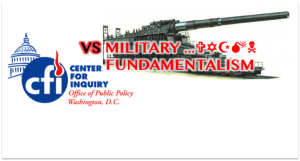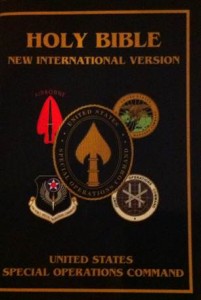Center for Inquiry Takes Up Fight Against Military Evangelism
 A new agency has taken up the struggle against religious fundamentalism in the US Military – the Center For Inquiry Office of Public Policy. The Office’s new director, Michael DeDora, commissioned a white paper from Dr James Parco to assess and make recommendations regarding fundamentalism in the US military. Dr Parco wrote 30 pages outlining the history, legal context, and and detrimental impact felt by men and women in uniform. His recommendations drew heavily from groundwork by the Military Religious Freedom Foundation and the Military Association of Atheists & Freethinkers. The paper ended with twelve admirable recommendations that would protect the secular character of government while unfortunately doing nothing to expand diversity to include nontheistic beliefs and practices.
A new agency has taken up the struggle against religious fundamentalism in the US Military – the Center For Inquiry Office of Public Policy. The Office’s new director, Michael DeDora, commissioned a white paper from Dr James Parco to assess and make recommendations regarding fundamentalism in the US military. Dr Parco wrote 30 pages outlining the history, legal context, and and detrimental impact felt by men and women in uniform. His recommendations drew heavily from groundwork by the Military Religious Freedom Foundation and the Military Association of Atheists & Freethinkers. The paper ended with twelve admirable recommendations that would protect the secular character of government while unfortunately doing nothing to expand diversity to include nontheistic beliefs and practices.
Update: Free Inquiry military feature (5 articles)
Click to view the Parco white paper
This white paper comes in advance of a military feature in the April/May issue of Free Inquiry magazine, the flagship publication of the Council for Secular Humanism, a sister organization of the Center For Inquiry. Jason Torpy, President of MAAF, gathered authors to write articles on several subjects and provided his own indictment of military practices from a humanist perspective. Dr Clifford Andrew talked about his successful organizing at the US Naval Academy. Army Major Ray Bradley discussed his own frustrations with internal efforts to be recognized as a humanist. Gretchen Mann, MD, discussed the humanist perspective on Moral Injury. Dr Carlos Bertha laid out the potential for a new contracted chaplaincy to resolve the current problems with the commissioned officer chaplaincy.
The recommendations in Dr Parco’s white paper begin an exhortation to beware false claims of progress. For example, the Air Force Academy celebrated its advances in Religious Respect while excluding the nontheistic perspective. This is just good advice. At the same time, real progress should be recognized, lest it be lost.
Several recommendations revolved around eliminating command sponsorship of religion. The “Crusader” mascot has been a continuing point of concern. MAAF helped a member recently encourage a new unit at Ft Leonard Wood from being called “Crusaders”. Former cadet Blake Page challenged the still-present Crusader cross and “Strong Faith” of West Point’s third cadet regiment. They have since selected a more appropriate motto. See the addendum below on unit mascots and mottos.
 Another continuing government promotion of Bibles. The Military Religious Freedom Foundation secured an injunction against LifeWay publishers who were using the Army crest on their Bibles. The Military Association of Atheists & Freethinkers succeeded in removing a requirement in Air Force lodging to place Bibles in all rooms. These successes are still only the tip of the iceberg of a much more systemic problem with government promotion of Christianity.
Another continuing government promotion of Bibles. The Military Religious Freedom Foundation secured an injunction against LifeWay publishers who were using the Army crest on their Bibles. The Military Association of Atheists & Freethinkers succeeded in removing a requirement in Air Force lodging to place Bibles in all rooms. These successes are still only the tip of the iceberg of a much more systemic problem with government promotion of Christianity.
Similar to these unit a logo actions, Parco recommended new rules on evangelistic speech by commanders in general and in eliminating prayer at mandatory functions. Free speech and free exercise of religion should be protected, but many commanders seem not to recognize that their official duties and the privileges and powers afforded them come with some responsibility to keep their personal beliefs to themselves. The Army chaplains even went on record to support sectarian prayer at official functions. This continues without challenge among military or civilian leadership.
Drs Parco and Fagin presented their “Oath of Equal Character“, which, in summary, requires military leaders to concur with the statement that those who belief differently are of equal worth and value. They found, “35% of mid-grade military officers admitted that they could never affirm the oath because ‘it isn’t true.'” While the wording of the oath was very strong, MAAF found similar push-back when originally putting forward it’s own “Minimum Statement of Support.” This oath asked chaplains to promise the same dedication and effort in their support of all service members that they give to those who share their own faith. Even though the language was much more objective and restricted. chaplains were unwilling to agree.
Calling for reform of the chaplaincy, Parco suggested options including humanist chaplaincy and chaplain support for humanists that MAAF suggests as well as more ‘nuclear’ options should the chaplaincy continue to be resistant to diversity and restrictions on proselytizing.
The Center For Inquiry has made a great step forward in publishing this new position paper against evangelism in the military. The recommendations are sound and should support the ongoing diversity-of-belief and anti-evangelism reform efforts of organizations like MAAF, MRFF, the Forum on the Military Chaplaincy, and, well, precious few others. The upcoming military issue of Free Inquiry magazine should be online within the next week or two. That will provide additional insights into local communities, personnel policy, “Moral Injury” care, and other topics affecting atheists and humanists in the military.
Addendum on mascots and mottos:
A MAAF study (See in Excel Format) of over 7000 unit mottos listed at the Pentagon’s Institute of Heraldry showed just 55 with mottos of an explicitly religious nature. Examples like For God and Country, God Wills It, Pray and Work, The Cross is My Life, and I Shall Conquer by the Cross are mottos that clearly promote religion and exclude nontheists and non-Christians. These should be prohibited. Mottos and mascots may not be the most egregious of offenses, but unit pride and unit cohesion are absolutely critical in a military unit. The motto and mascot in a unit is often fiercely promote and closely associated with being part of the unit. To dissent from unit identity is difficult and discouraged, and so the simple solution is to not use mottos that privilege and promote religion.
